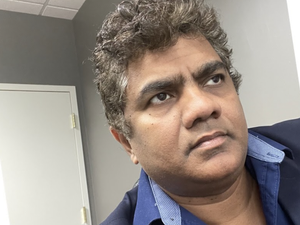
Before COVID-19, Atlanta startups had high hopes for 2020.
The funds were rolling in, there were tech jobs to go around and the community ended 2019 with a record amount in VC funding. Then, COVID-19 came to town.
In a time of uncertainty, loss, fear and challenges, a crystal ball might seem like the one solution that would help (second only to a vaccine). We spoke to a few experienced entrepreneurs and VCs in Atlanta about their best advice for startups during this global outbreak and their predictions about what might happen next. They're no fortune tellers, but they've got some educated guesses.
VC Activity Will Take a Hit
KP Reddy, founder and CEO of Atlanta-based incubator, accelerator and venture capital firm for BuiltTech startups, Shadow Ventures, has had experience running a business during the Great Recession. Most recently, he launched a public virtual community for startups, innovators, investors and others to collaborate, build and create content during the pandemic.
Reddy, who grew up in Atlanta, said the wealth effect in the metro area has allowed angel investors to play VC, which will go away with the economic effects of the pandemic.
"The angel community gets taken to zero," he said. "The other thing you're going to start to see is the out of town VCs that were coming here were because the deals were priced well --- they were priced right. There will be plenty of deals to be done in their own market, which means they don't need to come to Atlanta."
Reddy also said he's noticed smaller venture firms are looking to join forces. Since the shutdown, he's been approached to merge with or buy other venture firms.
"It's adult swim," he said. "Get all the kids out of the pool. That's what's going to happen with all the ventures and all startups in a little bit."
Michael Cohn and Sean O’Brien recently announced the initial closing of their first fund for Overline Ventures, Atlanta's newest early stage venture capital firm, with commitments totaling $17.5 million toward a target of $25 million. Overline expects to make the final close in the summer.
O'Brien said the duo were grateful to reach their first close before the pandemic really took hold of the country.
"We do, first of all want to be cognizant of the fact that we don’t want to celebrate the timing of our fund. It’s a terrible the time," he said. "This is going to be a very difficult time for startups around the country and we’ve already seen it. Michael and I have spent over the last couple of weeks, basically around the clock on the phone with founders, giving them advice, counsel, a couch to lay on and share their challenges with us. This is going to be a very difficult time. All that said --- we think it’s going to be a good time for a new fund with fresh capital to begin applying it."
Unlike funds that are in a deeper stage in life, Overline doesn't have a big portfolio of companies to support from a capital perspective, O'Brien said.
"So we’re completely open for business to look at opportunities, which is not going to be the case for other funds," he said. "We find that this very quickly has reset the market from a priority perspective. Companies don’t have stars in their eyes like they did just a short time ago."
These Businesses Will Thrive. Others Will Struggle.
MarTech startups that have done will in the local community will start seeing trouble, Reddy said.
"The bigger challenge is we have a big IT services business in this city," he said. "They are going to go through a cycle of slowness. Probably by next year, they're going to pick it back up."
On the corporate side, Reddy said he expects some of Atlanta's most successful Fortune 500 companies, such as Delta Air Lines, Cox Enterprises and IHG, will experience mass layoffs. Eventually, they will contract out work during hiring freezes, he said.
"They're going to be slow to add back," he said. "That's where staff and consulting companies are going to do well."
Businesses that will more than likely survive and thrive during the pandemic and post are telemedicine and health startups, Reddy said. Prior to the pandemic, there were barriers to scale telemedicine nationally because of select laws in each state, he said. It's an opportunity to work around past regulatory friction.
"They got rid of all that," he said. "I don't think we're ever going back that way."
Cohn, who also ran a startup during the Recession, said startups with capital efficiency would make it through.
"It's not lost on me that Cloud Sherpas was born during the last downturn," he said. "Companies that come out the other end will be stronger for it."
"The ones who are going to be able innovative, the ones that are going to be able to come out of this stronger than they went into it are the ones that are going to be able to afford to advance their business vs. just going into maintenance mode," O'Brien said.
Here's What You Can Do
For up-and-coming startups, Reddy said there will be plenty of talent available for companies to choose from. But he also stressed to focus on building product, rather than marketing.
"Don't spend a bunch of energy on how to market yourself," he said. "Right now, the market is an immovable object. Focus on product. God forbid your marketing people talk to your developers. Get into the details. A lot of startups move fast and loose. It's a great time to hit pause and dig into the details."
Speaking of product, it's a great time to get your products installed at little to no cost, Cohn said.
"This is an opportunity to experiment with different go to market approaches," he said.
"On that last point, I completely agree," O'Brien said. "There’s not a company that shouldn have the same marketing message today as they did four weeks ago. I think every business is different so it’s hard to generalize other than everyone’s message needs to be in context with the time."
For startups that were struggling prior to the pandemic, Reddy said this would be the perfect time to close the doors without the threat of a bad record.
"If your startup was marginally successful before this, this is a great time to shut down your startup, from a reputation standpoint," he said. "No one will hold it against you (and say,) 'What do you mean you didn't plan for a pandemic?' I think that's important because as an entrepreneur, you're working on your resume at all times."
Cohn echoed the phrase we've all been hearing as of late: "Cash is King."
"If startups are a little bit later-stage and they have access to credit lines, we’re advising founders to pull that capital for that rainy day," he said. "Assume revenue will be cut at least in half in their 2020 plan. We’re also trying to encourage founders not to cut but perhaps to cut back. Furlough perhaps, instead of letting them go outright or try to cut back hours."
The key, Cohn said, is founders making decisions and taking evasive action. Now is not the time to drag your feet.
"There’s really nothing worse than a slow set of cuts that comes out over time," he said. "That can really damage moral. It’s important for founders to get with boards and advisors and come up with a plan and to execute on that plan quickly."
But it's not just about surviving --- there's a good opportunity to play offense, especially on the hiring front, Cohn said.
"Talent has historically been a challenge for many startups. And nearly overnight, this has turned into a buyer’s market," he said. "I was just corresponding with three different founders over the last week who have either furloughed, gone into cockroach mode, closed their doors, whatever it is. There’s a lot of talent on the market right now. It’s not time to take advantage of people but it is a time to get aggressive. If you’ve been holding out on a particular hire, go for it."
Remember, It's Not All About Business.
Beyond advice for founders, Reddy also said it's the perfect time for everyone to pause and critically think about their next steps. He prompts everyone to think about where they want to live, what they want out of a career and life and whether changes are needed.
"It's a good time to think about life, right? My job, my work, my friends. It's a good time to hit pause and really chart a plan."
O'Brien said it's important to take time for yourself in addition to advising teammates. Burning out in this environment is not going to help anybody, he said.
"The point we’re really emphasizing first and last in all our conversations is just the importance of the mental and physical health of the founders and their teams," he said. "To recognize that everybody, no matter how experienced they are, is human at their core and we’re all dealing with a unique set of circumstances that none of us has dealt with before. (It's important to take) time out of their day for mental health and well-being, getting outside within the safe guidelines that have been provided."







